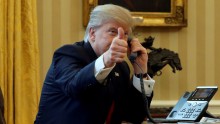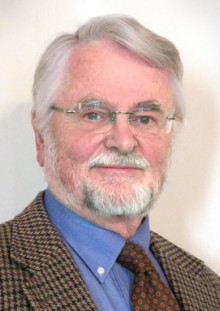Recently a group of 18 American opinion leaders visited Ukraine in the framework of a trip jointly organized by the Institute of World Policy and the Black Sea Foundation for Regional Cooperation. Its aim was to acquaint the experts for leading think-tanks and mass media editors with the actual situation in Ukraine, including the implementation of reforms, as well as getting Ukraine’s standpoint over, so that they could comment and cover the events in Ukraine, related to Russia’s aggression, from the standpoint of Kyiv and not via Russia’s propagandist mouthpieces.
The Day interviewed Serge SCHMEMANN, editor for the New York Times. In 1991 Schmemann won the Pulitzer Prize for covering the unification of Germany. On September 12, 2001 the New York Times carried a front-page article by him about the 9/11 attacks.
We began our conversation from the notion, recently emphasized by the White House chief strategist Steve Bannon, who said that American media did not yet understand why Trump had actually won.
“TRUMP IS A NEW PHENOMENON FOR AMERICA”
“I do not understand. But I think the issue is that the media in America is very much on the coasts: on the west coast and on the east coast. What is in the middle is not an empty space, but maybe a space that we did not understand enough. Maybe we weren’t aware of the anger, the frustration, so there was a certain amount of surprise. And then all the public opinion polls said Hillary Clinton would win, so yes, we were surprised, and I think that it is something that the media has now to study. We have to figure out why we were fooled. But it is happening everywhere, the media in England was fooled by Brexit. I think the world has entered a kind of a new template in which all the new orthodoxies are being changed. They were a certain set of presuppositions on which America functioned. For example, we assumed that politicians, even when they hate each other, do not insult each other personally, that people vote within a certain realm of familiar political precepts: you can be conservative or liberal, but we knew what that meant.
“Trump is for America a new phenomenon, a kind of a populism who has broken all the rules, and every time he broke a rule we thought he was finished. When he insults Senator McCain; when he makes fun of women; when he makes fun of a cripple… And suddenly we understand that this man can say whatever he wants, people accept what he is and they actually want to see the orthodoxies destroyed.”
“TRUMP IS LEARNING VERY QUICKLY”
How can the situation develop further?
“Now we have to figure out what has happened to our country. Has our country changed? Is it something we did not know? Is there an anger out there we did not know? Have we become too elitist? But it is very hard because also the media is changing, you know, with social media, with the internet. Everything is changing for us and for America, and we have to learn what it means, but I think for many people it has also been at first ‘oh my gosh, what we are going to do,’ but now we have decided we still fight for what we believe. When Trump lies, we say he lied. We do not say, ‘he said this, they said that.’ We say he lied. So there’s a kind of a new purpose to journalism. If he is going to play by new rules, we are going to force the old rules by content, because the old rules evolved over time, they are good rules, ‘you do not lie,’ you know, there is ‘you should be ashamed of things that are wrong.’ And I think Trump is learning very quickly (it has been two weeks) that you cannot do anything you want, that there are limitations on what you say, what you do, and how you say it. So today, for example, he accepted China’s one state version, he has backed down on that. So we will see whether he learns on the job, or whether he is going to try to change the job. So far, it is too early to say.”
“I BELIEVE IN TRADITIONAL JOURNALISM, FACT-BASED AND ETHICS-BASED”
Do you believe that the American checks and balances system eventually has effect on him, and Trump will start playing by the rules?
“The court system has already stopped him, and his new man he wants to put on the Supreme Court is a very proud judge, he will not let Trump do things. So Trump will yell, he’ll be a bully, but this system will hold. And I think the Republicans in Congress will also begin pushing back. They are not going to let him do whatever he wants. He thinks that, as in business, ‘I am the boss, I say, you do.’ And I think he is quickly learning.
“But we have to be careful, he is a dangerous man. We have to protect democracy. Democracy, someone said, should be a verb, not a noun. It is something that you have constantly to live and protect. And I think that what we have to do in journalism, first of all, we have to defend our democracy and our freedom of speech. We will not allow him to bully us.
“Personally I am a very, very strong believer in traditional journalism, fact-based, ethics-based, you know. I spent my whole life [in journalism], and I am not going to let anybody push us off.”
Why do you think Trump does not criticize Putin?
“I think it is very dangerous for Putin. ‘Putin is my friend, Putin is my friend,’ but then national interests are very different. And then one day – wait a minute, my friend is not doing what I want him to do, and then – bam! And Trump is a man who takes things very personally, who will be personally insulted, so I think Putin’s going to be very careful. I think Putin is smart, and he will be very careful. He understands this is an unpredictable man who can turn against you in a minute.”
“PUTIN IS A MASTER CHESS PLAYER AND WILL NOT GIVE UP EASY”
As a member of the US delegation, you met President Poroshenko. Would you share your impressions of this encounter?
“Obviously, there’s a lot happening here, and I think a lot of people are frustrated that it is not fast enough, but given that the whole world right now is very chaotic, there seems to be a huge determination here that we’ve seen among the people we’ve met, including President Poroshenko. They recognize the problems, they recognize the troubles, they recognize what needs to be done, and they are trying to do it. And I think it will happen, but it is very slow. I mean, all these battles that Ukraine is fighting, against corruption, for development, it all takes time. And if you are trying to fight a war, it is not going to happen very quickly. But certainly the determination is there, and I only hope there is also the patience that you need. And you need to be patient because it is a slow and painful process, to build a country. And you know, when Europe is all chaotic, when America is chaotic, it makes it very difficult. And Putin is a master chess player, he is not going to give up easy.”
“POROSHENKO SHOULD MAKE IT CLEAR TO TRUMP THAT AMERICA HAS MADE CERTAIN COMMITMENTS AND SHOULD LIVE UP TO THEM”
It is known that during their telephone conversation the Ukrainian and American presidents arranged to meet personally. Foreign minister Pavlo Klimkin has already left to Washington, D.C., to fix the date. What issues do you think Ukraine’s President should raise?
“He represents Ukrainian national interests and he should just make it totally clear to Trump that America has made certain commitments, that they should live up to those commitments, that Ukraine trusts America, that Ukraine is trying to build democracy, and that the United States should be a strong supporter. I think he has made this case, and I think trouble is that as they say, we do not know which way Trump can go.”
“WE RECOGNIZED THAT WALTER DURANTY’S COVERAGE WAS WRONG”
In 2003 The Day joined in an action demanding to revoke the Pulitzer Prize awarded to the New York Times journalist Walter Duranty for his apology of Stalin and misleading the world about the Holodomor, 1932-33 genocide in Ukraine, and for denying the Holodomor. We would like to hear your opinion of such lack of professionalism in an American journalist and your assessment of the newspaper’s reaction.
“We have a gallery of winners of the Pulitzer Prize, and I think they took him down. And I think we recognized that his coverage was wrong. But we do not control the Pulitzer Prize.”









